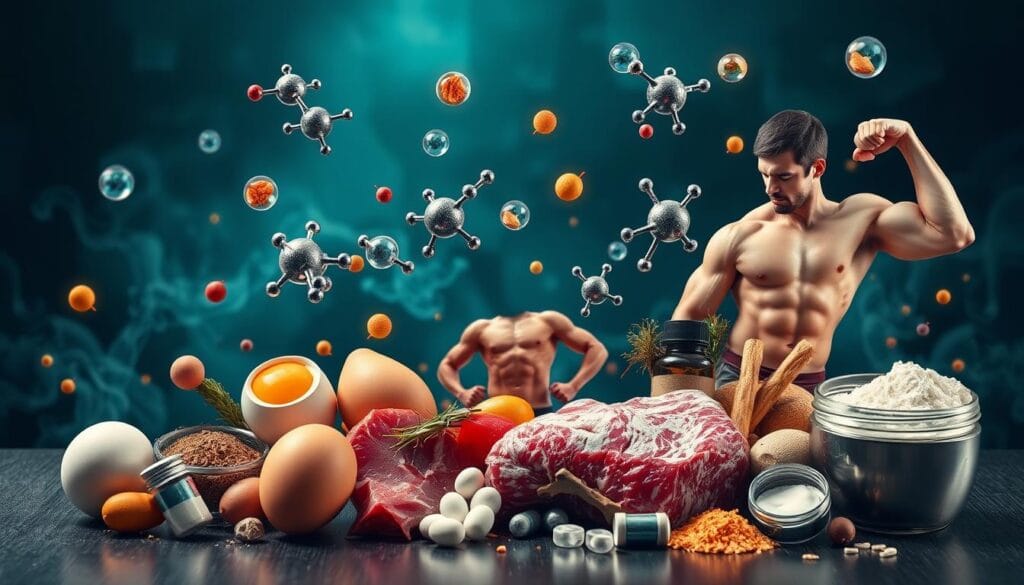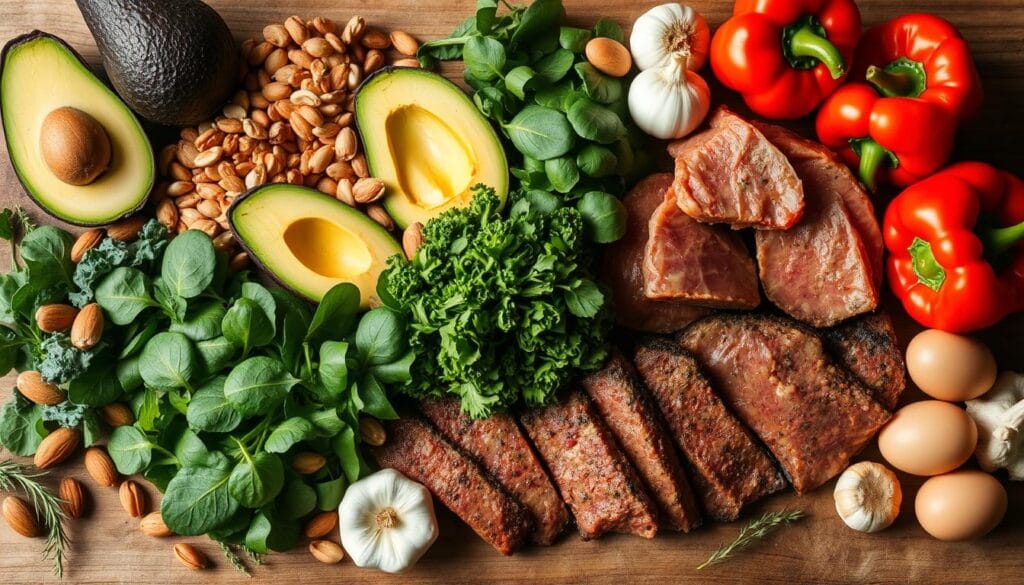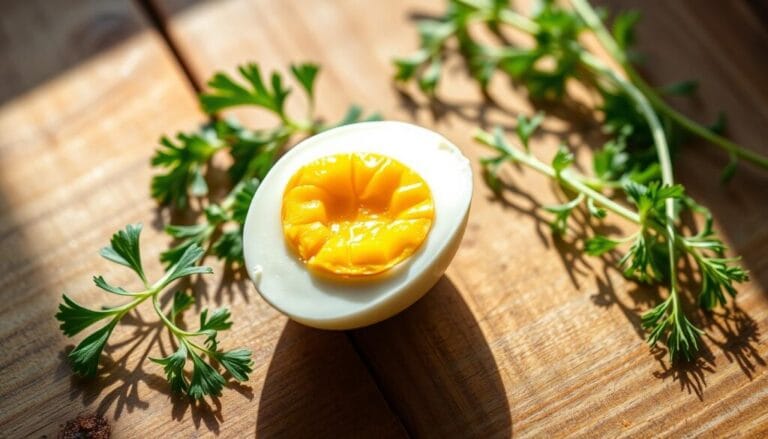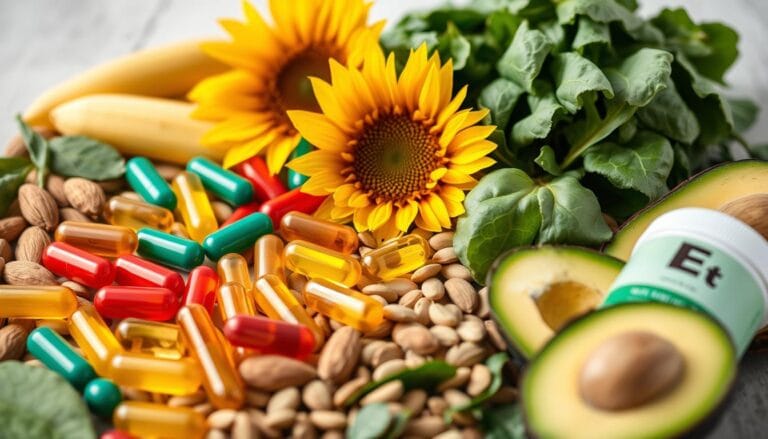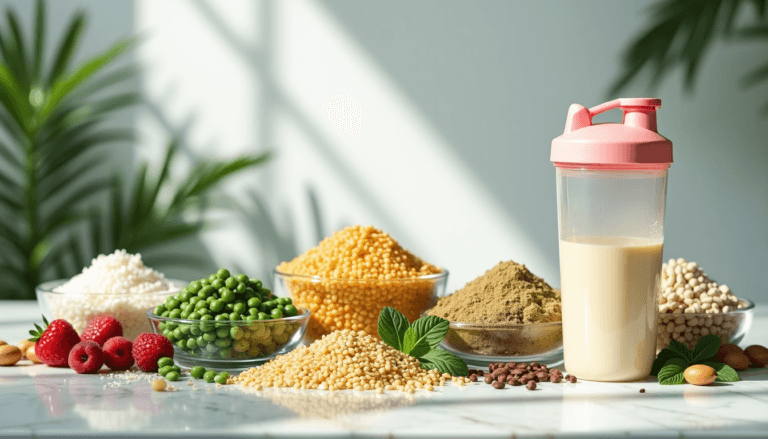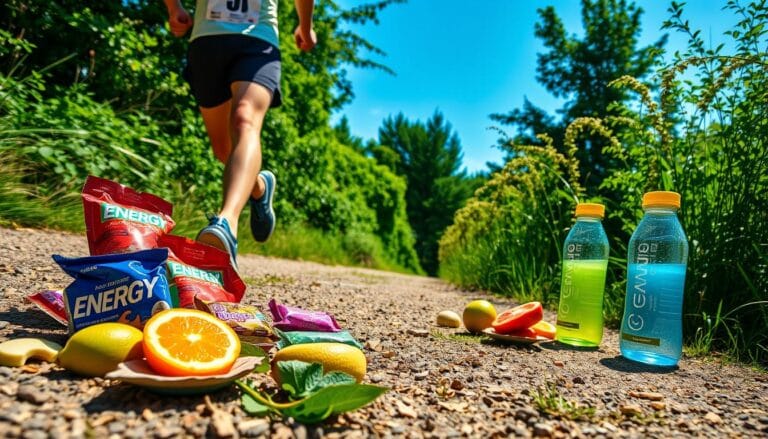The Best Food Supplements Testosterone 1
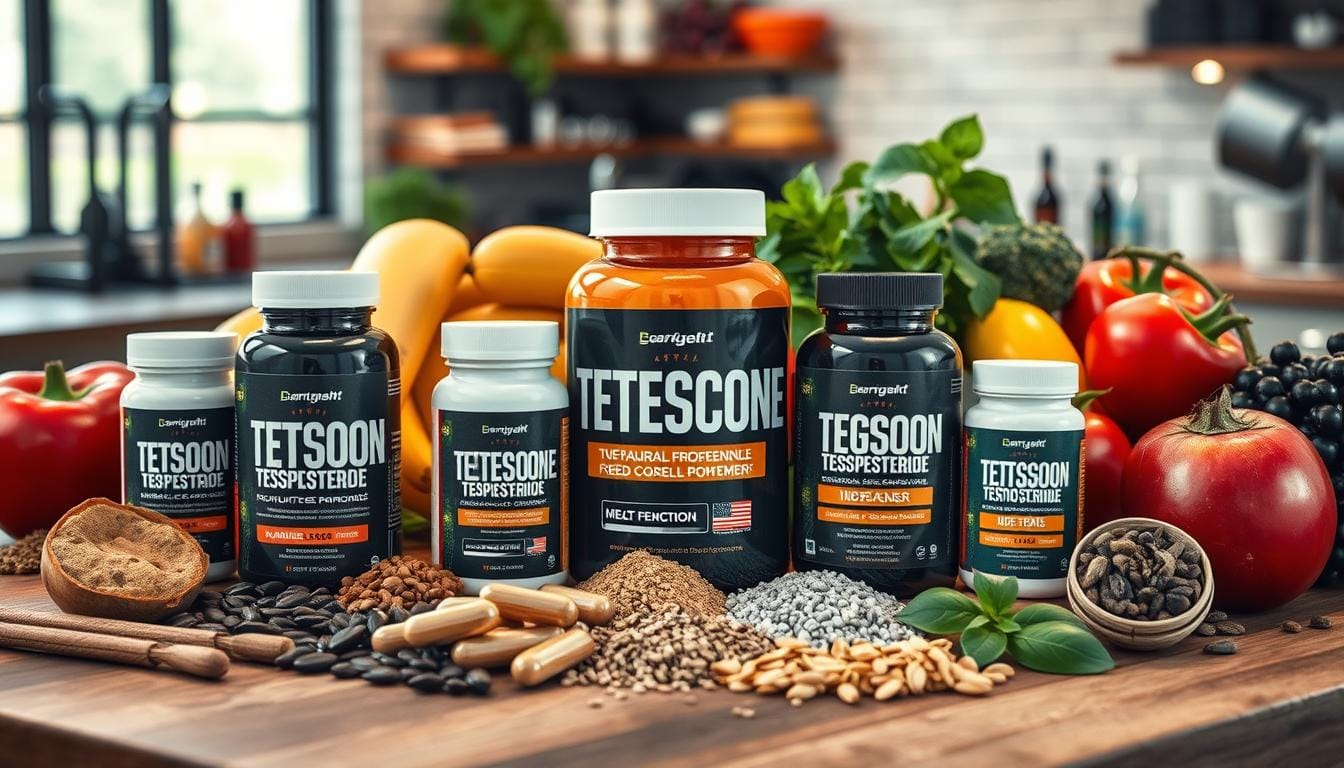
The Best Food Supplements Testosterone 1 I’ve always been curious about how our bodies work and the role of hormones. Recently, I’ve been really interested in testosterone. It’s the hormone linked to energy, strength, and sex drive. Many people look for quick fixes in supplements, but the best solutions often come from nature.
In this guide, we’ll look at the best natural foods and supplements for testosterone. You’ll learn about important vitamins, minerals, adaptogenic herbs, and omega-rich fish. These are the tools nature gives us to control our hormone levels and live well.
Table of Contents
Key Takeaways
- Discover the top natural food sources and supplements that can boost testosterone levels
- Learn about the essential nutrients required for optimal hormone production
- Understand the importance of lifestyle factors like exercise, sleep, and stress management
- Explore the potential benefits and limitations of OTC testosterone boosters
- Uncover a holistic approach to maintaining healthy testosterone levels
READ MORE : How Many Vitamin E Cases Are There 01
Understanding Testosterone and Its Importance
Testosterone is a key hormone for men, affecting many body functions. It’s important for reproductive health, muscle growth, and overall energy. Knowing how vital this hormone is helps keep you feeling your best.
The Role of Testosterone in Body Function
Testosterone helps develop and keep male traits like facial hair and a deep voice. It also boosts muscle mass and supports sex drive, sperm production, and erections. Having enough testosterone is key for your body image, energy, and mental health awareness.
Natural Testosterone Production Cycles
Testosterone levels usually peak in early adulthood and then drop, starting around 30. This drop can cause symptoms like lower sex drive, thyroid condition, tiredness, and mood swings.
Signs of Low Testosterone Levels
- Decreased sex drive and libido
- Erectile dysfunction
- Fatigue and lack of energy
- Decreased muscle mass and strength
- Mood changes, such as depression or irritability
- Increased body fat
- Difficulty concentrating or memory issues
If you notice these signs, talk to your doctor. They can help find the cause and suggest treatments.
“Testosterone is the key to a man’s vitality and well-being. Maintaining healthy levels is essential for optimal physical and mental performance.”
Best Natural Food Sources for Testosterone Enhancement
Eating healthy and adding foods that boost testosterone can help your body naturally. Foods like zinc-rich oysters and omega-3 fatty fish are great. They help keep your testosterone levels up and support a healthy lifestyle.
Oysters are a top choice for boosting testosterone because they’re full of zinc. Zinc is key for making testosterone. Eating oysters a few times a week can give you a testosterone boost.
Leafy greens like spinach and kale are also good for testosterone. They’re packed with magnesium, a mineral important for testosterone. Magnesium helps increase testosterone by supporting hormone production.
| Food Source | Key Testosterone-Boosting Nutrients |
|---|---|
| Oysters | Zinc |
| Fatty Fish (Salmon, Mackerel, Tuna) | Omega-3 Fatty Acids |
| Leafy Greens (Spinach, Kale) | Magnesium |
| Pomegranates | Antioxidants |
| Onions and Garlic | Phytochemicals |
| Eggs | Cholesterol, Vitamin D |
Fatty fish like salmon, mackerel, and tuna are also good for testosterone. They’re full of omega-3s, which support healthy testosterone levels. Adding fatty fish to your meals can be tasty and beneficial.
Pomegranates, onions and garlic, and whole eggs also boost testosterone. Pomegranates have antioxidants that help keep testosterone levels up. Onions and garlic have phytochemicals that support hormone production. Whole eggs are important for testosterone because of their cholesterol and vitamin D.
By eating these natural foods, you can support your eating habits and healthy lifestyle changes. A balanced diet is key for healthy testosterone levels and overall well-being.
Essential Minerals and Vitamins for Testosterone Production
Keeping testosterone levels right is key for health and happiness. Exercise and sleep are important, but the right nutrients matter too. Let’s look at the nutrients that help make testosterone.
Zinc-Rich Foods and Their Benefits
Zinc is vital for making testosterone. Eating foods like shellfish, red meat, beans, and nuts can help. Studies show zinc can boost testosterone, improve sex life, and sperm quality in men.
Vitamin D Sources and Impact
Vitamin D helps control testosterone. You can get it from fatty fish, egg yolks, and sunlight. Vitamin D supplements can raise testosterone, especially in those who lack it.
Magnesium’s Role in Hormone Balance
Magnesium is key for hormone balance, including testosterone. You can find it in green leafy veggies, nuts, seeds, and whole grains. Magnesium supplements can increase testosterone in both active and inactive men.
Eating nutrient-rich foods and using supplements can help your body make testosterone. A balanced diet and lifestyle are essential for good hormone health.
“Optimal nutrition is the foundation for supporting natural testosterone production and overall hormonal health.”
Top Testosterone Food Supplements
As men get older, their testosterone levels drop about 1% each year after 40. Many turn to supplements to fight this decline. These supplements have natural ingredients that help boost testosterone.
Popular supplements include Testosil, Testodren, Xwerks RISE, Testo Prime, Prime Male, and TestRX. They often have ashwagandha, zinc, vitamin D, magnesium, and D-aspartic acid. These ingredients aim to enhance testosterone levels.
Ashwagandha can raise testosterone by up to 15%. Zinc can double testosterone in those who lack it. Magnesium and vitamin D are also key for hormone balance. But, tribulus terrestris’s effects are still unclear.
Choosing a testosterone supplement involves looking at ingredient quality, dosage, and any medication interactions. Talking to a healthcare professional is wise. They can help ensure the supplement is safe and effective for kelly clarkson’s weight loss journey and overall health.
| Supplement | Key Ingredients | Potential Benefits | Price |
|---|---|---|---|
| Testosil | Vitamin D, zinc, magnesium, ashwagandha | Supports natural testosterone production | $78 |
| TestoPrime | Ashwagandha, zinc, vitamin D | Helps boost testosterone levels | $65 |
| Xwerks RISE | D-aspartic acid, zinc, vitamin D, magnesium | Enhances overall male vitality | $69 |
The success of testosterone supplements can differ. A healthy diet, regular exercise, and enough sleep are key for hormone levels. A healthcare professional can guide the best plan for your needs.
The Power of Omega-3 Fatty Acids and Fish Oil
Omega-3 fatty acids are powerful nutrients that offer many health benefits. They support your heart, joints, and even testosterone levels. These essential fatty acids are key for cell structure, metabolism, hormone production, and reducing inflammation.
Best Fish Sources for Testosterone Support
Certain fish are great for boosting testosterone naturally. Cold-water fatty fish like mackerel, herring, salmon, sardines, and trout are rich in omega-3s. A 6-ounce serving of wild salmon has almost as much omega-3s as two 1,000-milligram fish oil capsules.
Recommended Daily Intake Guidelines
The right amount of omega-3s varies by individual. Healthy adults should aim for 200-500 mg of EPA and DHA daily. For heart health or fertility, you might need more. Always talk to a healthcare provider about your specific needs.
| Omega-3 Source | Omega-3 Content |
|---|---|
| Wild Salmon (6 oz) | 1,800-2,400 mg |
| Herring (3 oz) | 1,700 mg |
| Mackerel (3 oz) | 1,600 mg |
| Sardines (3 oz) | 1,350 mg |
| Trout (3 oz) | 1,100 mg |
While supplements are helpful, whole foods are best. Eating these nutrient-rich fish supports your health and may boost testosterone.
Plant-Based Options for Testosterone Enhancement
Testosterone isn’t just found in animal foods. There are plant-based options that can help keep testosterone levels healthy. Fenugreek seed extracts, ashwagandha root, and mucuna puriens have shown promise in studies. More research is needed, but adding these to a diet rich in leafy greens, nuts, seeds, and whole grains is beneficial.
Leafy greens like kale, spinach, and chard are full of boron and magnesium. These can boost free testosterone levels in just a week. Nuts and seeds, such as almonds, walnuts, and flaxseeds, are great for healthy fats, zinc, and minerals important for testosterone.
- Fenugreek seed extracts have been found to significantly increase total testosterone levels and improve sexual function in clinical trials.
- Ashwagandha, an ancient Ayurvedic herb, has been shown to increase testosterone in healthy males according to research.
- Mucuna puriens, also known as velvet bean, has been studied for its potential to enhance testosterone production.
Adding a variety of plant-based foods and supplements can naturally support testosterone levels and hormonal balance. A diet rich in nutrients and exploring plant-based options can lead to a healthy lifestyle and better eating habits.
The Role of Protein in Testosterone Production
Protein is key for keeping testosterone levels healthy. It plays a big role in making and controlling this important male hormone. Knowing how protein and testosterone work together can help you eat right and exercise well. This supports your body image and fitness goals.
Animal vs. Plant Protein Sources
Both animal and plant proteins can boost testosterone. Animal proteins, like eggs and lean meats, have all the amino acids needed for hormones. Plant proteins, such as legumes and soy, also help when part of a balanced diet.
Optimal Protein Intake Levels
The right amount of protein for testosterone varies by age, weight, and activity. Adults usually need 0.8 grams of protein per kilogram of body weight. But, those who exercise a lot or want to build muscle might need 1.6 to 2.2 grams per kilogram.
Talking to a nutritionist or doctor is key to finding the right protein for you. Eating too much protein, from supplements or foods, can be bad. So, finding the right balance is important.
| Protein Source | Testosterone Benefits |
|---|---|
| Whey Protein | Studies show whey protein supplements, with exercise, boost testosterone more than a placebo. |
| Casein Protein | Casein’s effect on testosterone is less studied, but it might work like whey due to its amino acids and muscle recovery. |
| Plant-based Proteins | Plant proteins, rich in whole grains and legumes, help balance testosterone without harm, supporting muscle growth and hormone health. |
Eating a mix of quality proteins, from animals or plants, helps keep testosterone levels healthy. This supports your fitness and body image goals.
Foods and Supplements to Avoid
Keeping a healthy diet is key to supporting your testosterone levels. Some foods and supplements can actually harm you. Let’s look at what you should avoid for better healthy lifestyle changes.
Processed foods with trans fats can lower your testosterone. These unhealthy fats are in fried foods, baked goods, and margarine. They can upset your hormone balance. Also, foods in cans or plastic may have hormone-disrupting chemicals that affect testosterone.
Too much alcohol is bad for testosterone too. Studies show that drinking 15 or more drinks a week for men and 8 or more for women can lower testosterone. It can also hurt your sexual function.
- Avoid processed and fried foods high in trans fats
- Limit consumption of canned or plastic-packaged foods
- Reduce excessive alcohol intake to maintain healthy testosterone levels
Some supplements can also harm testosterone. Always research new supplements and talk to your doctor before using them.
Being careful about what you eat and take can help your eating habits. It supports your healthy lifestyle changes for better health.
Lifestyle Factors Affecting Testosterone Levels
Keeping testosterone levels healthy is key for feeling good. Different lifestyle choices can affect how much hormone your body makes. Knowing how these choices impact your testosterone can help you stay healthy.
Exercise and Physical Activity
Working out, especially with weights and HIIT, boosts testosterone. These exercises help your body make more of this important hormone.
Sleep Quality and Hormone Production
Good sleep is vital for hormone production, including testosterone. Not getting enough sleep can lower testosterone levels. Try to sleep 7-8 hours a night to keep your hormones balanced.
Other lifestyle choices like managing stress, staying at a healthy weight, and avoiding certain substances also matter. A whole-body approach to health can help your body work its best.
“Testosterone is crucial for developing male traits and reproductive functions. Low testosterone can lead to symptoms such as fatigue, depression, low sex drive, and loss of muscle mass.”
A healthy lifestyle includes eating well, exercising, sleeping well, and managing stress. By focusing on these, you can keep your testosterone levels up and stay healthy. This way, your body can thrive and feel its best.
Combining Diet and Supplements Effectively
To boost testosterone, a mix of a healthy diet and supplements works well. This approach helps your body make more testosterone naturally. It also helps optimize it.
Begin with a diet full of foods that support testosterone. Eat zinc-rich foods like oysters, red meat, and beans. Also, add vitamin D sources like fatty fish, egg yolks, and fortified dairy. Don’t forget magnesium-rich foods like spinach, almonds, and avocados for hormone balance.
| Nutrient | Recommended Daily Intake | Top Food Sources |
|---|---|---|
| Zinc | 8-11 mg for adults | Oysters, red meat, beans, nuts |
| Vitamin D | 600-800 IU for adults | Fatty fish, egg yolks, fortified dairy |
| Magnesium | 310-420 mg for adults | Spinach, almonds, avocados |
Supplements can also help boost testosterone. Ashwagandha, fenugreek, and zinc are good choices. But, always talk to a healthcare provider or dietitian before starting supplements. They can help based on your health and needs.
It’s all about finding the right balance. A healthy celebrity diet plans and the right motivation tips are key. They support your health and testosterone levels.
“Combining a healthy diet with targeted supplements can be a powerful way to naturally support your testosterone levels and overall well-being.”
Safety Considerations and Potential Side Effects
It’s important to know about the safety and side effects of testosterone-boosting foods and supplements. These natural methods can be helpful, but you should be careful. Always talk to your doctor before adding them to your routine.
Some supplements, like high zinc doses, can cause copper deficiency and anemia. DHEA, used to boost testosterone, is banned for athletes because of its side effects. Ginseng, a popular ingredient, can lead to high blood pressure, insomnia, and headaches in some people.
Testosterone therapy, through supplements or medications, also has risks. In the U.S., prescriptions for testosterone in men over 60 have grown a lot since 2001. But, many patients didn’t really need this treatment.
Testosterone therapy can increase the risk of heart disease, blood clots, and low sperm count. It can also raise blood pressure and cause liver problems. Side effects of testosterone injections include bruising, enlarged prostate, weight gain, and mood changes.
Always talk to a healthcare provider before starting any new supplement or medication. This is especially true if you have health issues or are taking other medications. They can help you understand the benefits and risks, ensuring your choice is safe and healthy.
While natural ways to boost testosterone are useful, your safety is most important. By being careful and working with your doctor, you can find the right mix of diet, lifestyle, and supplements. This way, you can support your hormonal health without risking your overall well-being.
Conclusion
Natural testosterone food supplements can be great for your health when used right. They should be part of a balanced diet and a healthy lifestyle. Remember, more research is needed to fully understand their long-term effects.
The best way to boost your testosterone is through whole foods, exercise, managing stress, and getting enough sleep. Adding foods like zinc-rich seafood, vitamin D-rich dairy, and magnesium-rich leafy greens to your diet is smart. An active lifestyle, including strength training and stress-reducing activities, also helps.
For personalized advice, talk to healthcare professionals. They can help you find the best approach for your needs. By focusing on your overall health, you can support your body’s natural testosterone production. This leads to balanced hormones and many benefits.

